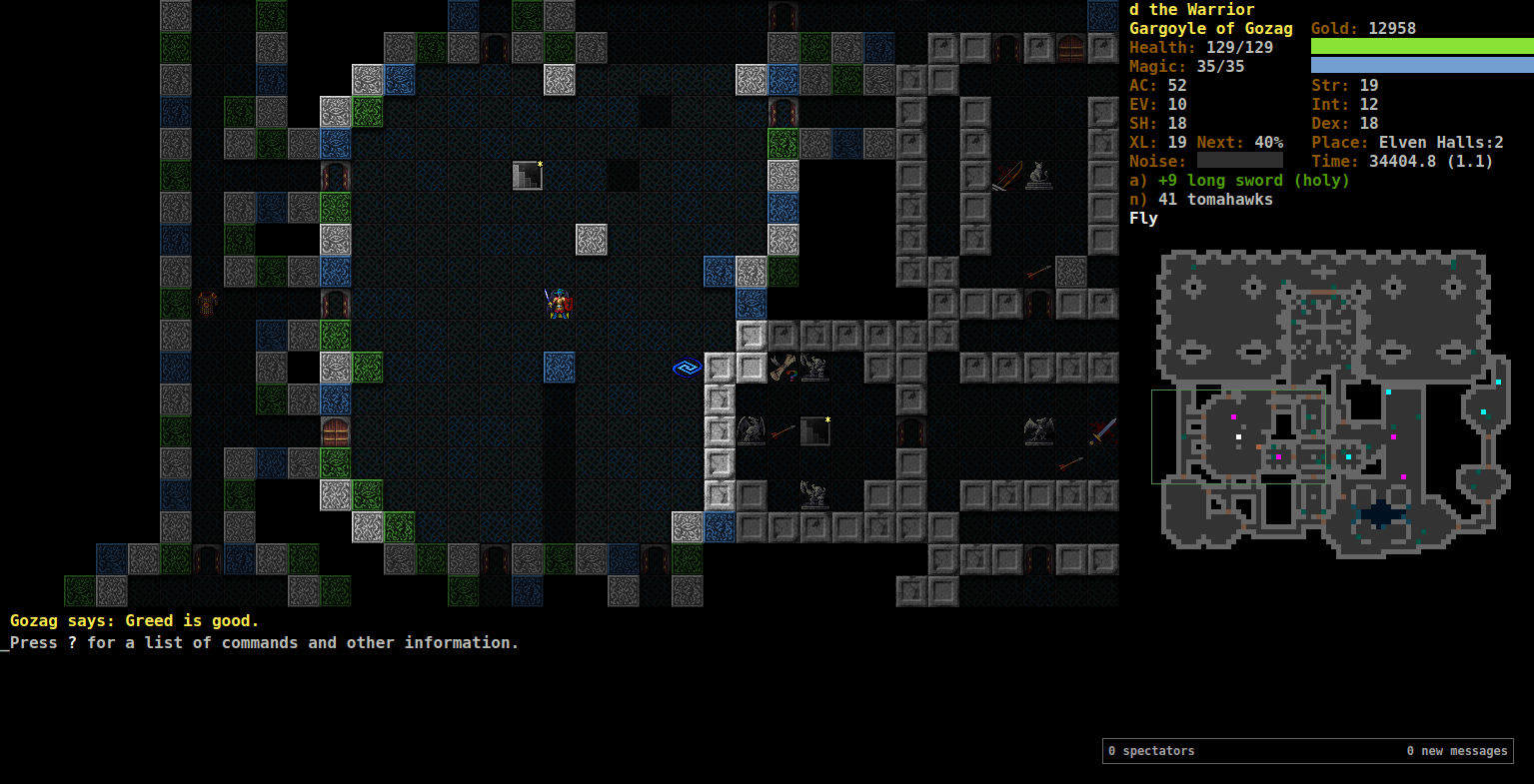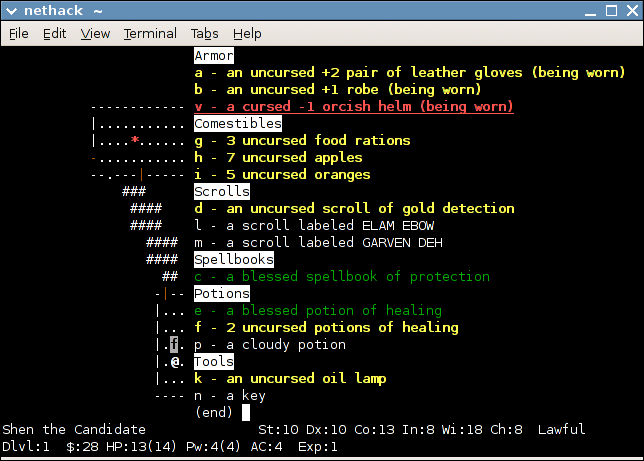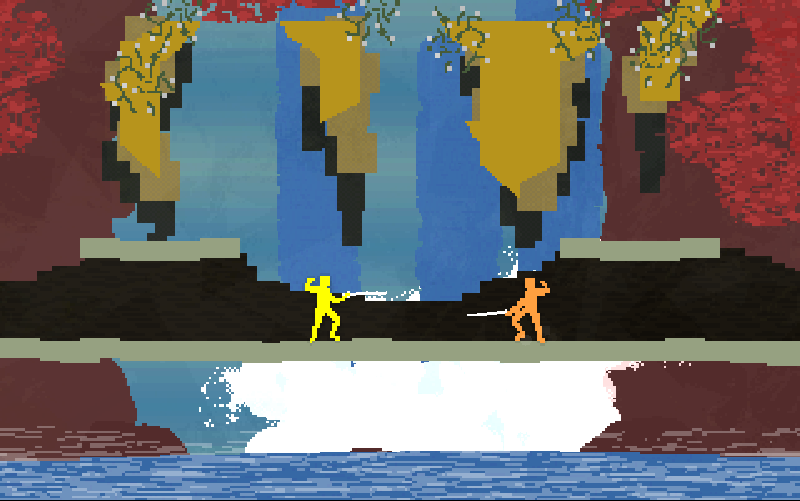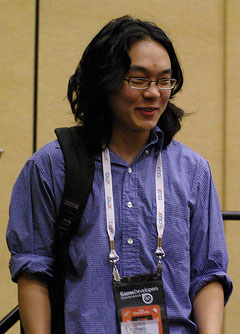|
Roguelike
Roguelike (or rogue-like) is a style of role-playing game traditionally characterized by a dungeon crawl through procedurally generated levels, turn-based gameplay, grid-based movement, and permanent death of the player character. Most roguelikes are based on a high fantasy narrative, reflecting the influence of tabletop role-playing games such as ''Dungeons & Dragons''. Though '' Beneath Apple Manor'' predates it, the 1980 game '' Rogue'', which is an ASCII based game that runs in terminal or terminal emulator, is considered the forerunner and the namesake of the genre, with derivative games mirroring ''Rogue''s Text-based game, character- or Sprite (computer graphics), sprite-based graphics. These games were popularized among college students and computer programmers of the 1980s and 1990s, leading to hundreds of variants. Some of the better-known variants include ''Hack (video game), Hack'', ''NetHack'', ''Ancient Domains of Mystery'', ''Moria (1983 video game), Moria' ... [...More Info...] [...Related Items...] OR: [Wikipedia] [Google] [Baidu] |
The Binding Of Isaac (video Game)
''The Binding of Isaac'' is a 2011 roguelike action-adventure game designed by independent developers Edmund McMillen and Florian Himsl. It was initially released for Microsoft Windows, then ported to OS X and Linux. The game's title and plot are inspired by the Biblical story of the Binding of Isaac. In the game, Isaac's mother receives a message from God demanding the life of her son as proof of her faith, and Isaac, fearing for his life, flees into the monster-filled basement of their home where he must fight to survive. Players control Isaac or one of the 6 other unlockable characters through a procedurally generated dungeon in a roguelike manner, fashioned after those of ''The Legend of Zelda'', defeating monsters in real-time combat while collecting items and power-ups to defeat bosses and eventually Isaac's mother. The game was the result of a week-long game jam between McMillen and Himsl to develop a ''The Legend of Zelda''-inspired roguelike that allowed McMillen to ... [...More Info...] [...Related Items...] OR: [Wikipedia] [Google] [Baidu] |
Dungeon Crawl Stone Soup
''Dungeon Crawl Stone Soup'' (''DCSS'') is a free and open source roguelike computer game and the community-developed successor to the 1997 roguelike game ''Linley's Dungeon Crawl'', originally programmed by Linley Henzell. It has been identified as one of the "major roguelikes" by John Harris. ''Dungeon Crawl Stone Soup'' was first among roguelikes in ASCII Dreams' Roguelike of the Year in 2008, in a poll of 371 roguelike players. It later polled second in 2009 (behind '' DoomRL'') and 2010 (behind '' ToME 4''), and third in 2011 (behind ''ToME 4'' and '' Dungeons of Dredmor''). The game is released under the GNU GPL-2.0-or-later. The latest release is version 0.320.32, released on Aug 30, 2024. "Stone Soup" refers to the European folk story in which hungry strangers convince the people of a town to each share a small amount of their food in order to make a meal that everyone enjoys. Gameplay ''Dungeon Crawl Stone Soup'' is a roguelike game where the player creates a char ... [...More Info...] [...Related Items...] OR: [Wikipedia] [Google] [Baidu] |
Tales Of Maj'Eyal
''Tales of Maj'Eyal'' is an open-source roguelike video game released for Microsoft Windows, macOS, and Linux in 2012. ''Tales of Maj'Eyal'' is available as freeware ( donationware) from the developers on a donation-supported basis; donations unlock exclusive online features as part of a freemium model. The game can also be purchased through digital distribution platforms such as Steam and GOG. The game's TE4 game engine source code is licensed under GNU GPLv3, while the game's assets are licensed for use exclusively within ''Tales of Maj'Eyal''. Gameplay ''Tales of Maj'Eyal'' is a dungeon crawl game featuring a customizable graphical interface that combines classic roguelike keyboard commands with a mouse-driven interface. Unlike many older roguelike games, ''Tales of Maj'Eyal'' includes full-color graphics and can be played almost entirely with the mouse. Although it features permadeath, players can earn extra lives through various means, such as in-game achievements and le ... [...More Info...] [...Related Items...] OR: [Wikipedia] [Google] [Baidu] |
NetHack
''NetHack'' is an open source single-player roguelike video game, first released in 1987 and maintained by the NetHack DevTeam. The game is a fork of the 1984 game ''Hack'', itself inspired by the 1980 game '' Rogue''. The player takes the role of one of several pre-defined character classes to descend through multiple dungeon floors, fighting monsters and collecting treasure, to recover the "Amulet of Yendor" at the lowest floor and then escape. As an exemplar of the traditional "roguelike" game, ''NetHack'' features turn-based, grid-based hack and slash and dungeon crawling gameplay, procedurally generated dungeons and treasure, and permadeath, requiring the player to restart the game anew should the player character die. The game uses simple ASCII graphics by default so as to display readily on a wide variety of computer displays, but can use curses with box-drawing characters, as well as substitute graphical tilesets on machines with graphics. While ''Rogue'', ''Hack'' an ... [...More Info...] [...Related Items...] OR: [Wikipedia] [Google] [Baidu] |
Ancient Domains Of Mystery
''Ancient Domains of Mystery'' is a roguelike video game designed and developed by Thomas Biskup and released in 1994. The player's goal is to stop the forces of Chaos that invade the world of Ancardia. The game has been identified as one of the "major roguelikes" by John Harris. Like the original roguelike games, ''Ancient Domains of Mystery'' uses ASCII graphics to represent the game world. A later version added the option to play with sound, tile-based graphics, and an overworld map. Most dungeons are procedurally generated, but once the game generates a dungeon, it does not change even if the player exits and re-enters it. Biskup ceased development of the game for nine years and revisited it in 2012. He then resumed work on a sequel, ''Ultimate ADOM'', an engine for future roguelike games. Biskup first made an updated version of ''Ancient Domains of Mystery'' available to sponsors of his crowdfunding campaign. Later versions, beginning with v1.15.2.r60, were released on the ... [...More Info...] [...Related Items...] OR: [Wikipedia] [Google] [Baidu] |
Mystery Dungeon
''Mystery Dungeon'', known in Japan as is a series of roguelike role-playing video games. Most were developed by Chunsoft, now Spike Chunsoft since the merging in 2012, and select games were developed by other companies with Chunsoft's permission. The series began when co–creator of ''Dragon Quest'', Koichi Nakamura, was inspired by Seiichiro Nagahata's experience with '' Rogue'', who is also a fellow developer from the company, and a desire to create an original series. It began on the Super Famicom, progressing to almost all of Nintendo's and Sony's home and handheld consoles, WonderSwan, Dreamcast, Windows, and mobile devices. The series has inspired other entries in Japan and has moderate popularity, mostly from crossover entries with the ''Dragon Quest'', '' Chocobo'', and '' Pokémon Mystery Dungeon'' series. Despite the moderate popularity of the franchise, there have been numerous manga, anime, and novels published under it, whether they are coming from the company' ... [...More Info...] [...Related Items...] OR: [Wikipedia] [Google] [Baidu] |
Angband (video Game)
''Angband'' is a dungeon-crawling roguelike video game derived from '' Umoria''. It is based on the writings of J. R. R. Tolkien, in which Angband is the fortress of Morgoth. The current version of ''Angband'' is available for all major operating systems, including Unix, Windows, Mac OS X, and Android. It is identified as one of the "major roguelikes" by John Harris. ''Angband'' is a free and open source game under the GNU GPLv2 or the angband license. Gameplay The goal of ''Angband'' is to survive 100 floor levels of the fortress Angband in order to defeat Morgoth. The game is reputed to be extremely difficult. The player begins in a town where they can buy equipment before beginning the descent. Once in the maze-like fortress, the player encounters traps, monsters, equipment, and hidden doors. With the help of found objects and enchantments, the player's attack and defense power increases, and can even neutralise specific attacks. The player also meets characters and find ... [...More Info...] [...Related Items...] OR: [Wikipedia] [Google] [Baidu] |
Indie Game
An indie video game or indie game (short for independent video game) is a video game created by individuals or smaller development teams without the financial and technical support of a large game publisher, in contrast to most "AAA" (triple-A) games. Because of their independence and freedom to develop, indie games often focus on innovation, experimental gameplay, and taking risks not usually afforded in AAA games. Indie games tend to be sold through digital distribution channels rather than at retail due to a lack of publisher support. The term is analogous to independent music or independent film in those respective mediums. Indie game development bore out from the same concepts of amateur and hobbyist programming that grew with the introduction of the personal computer and the simple BASIC computer language in the 1970s and 1980s. So-called bedroom coders, particularly in the United Kingdom and other parts of Europe, made their own games and used mail order to distribute th ... [...More Info...] [...Related Items...] OR: [Wikipedia] [Google] [Baidu] |
Rogue (video Game)
''Rogue'' (also known as ''Rogue: Exploring the Dungeons of Doom'') is a dungeon crawling video game by Michael Toy and Glenn Wichman with later contributions by Ken Arnold. ''Rogue'' was originally developed around 1980 for Unix-based minicomputer systems as a freely distributed executable. It is listed in the 4th Berkeley Software Distribution UNIX programmer's manual of November 1980, as one of 28 games included (along with Zork, Colossal Cave Adventure, Hunt the Wumpus and Mike Urban's Aardvark). It was later included in the Berkeley Software Distribution 4.2 operating system (4.2BSD). Commercial ports of the game for a range of personal computers were made by Toy, Wichman, and Jon Lane under the company A.I. Design and financially supported by the Epyx software publishers. Additional ports to modern systems have been made since by other parties using the game's now-open source code. In ''Rogue'', players control a character as they explore several levels of a dungeon seek ... [...More Info...] [...Related Items...] OR: [Wikipedia] [Google] [Baidu] |
Hack (video Game)
''Hack'' is a 1984 roguelike video game that introduced shops as gameplay elements and expanded available monsters, items, and spells. It later became the basis for ''NetHack''. History and development ''Hack'' was created in 1982 by Jay Fenlason with the assistance of Kenny Woodland, Mike Thome, and Jonathan Payne, while students at Lincoln-Sudbury Regional High School. A greatly extended version was first released on Usenet in 1984 by Andries Brouwer. Brouwer continued to work on ''Hack'' until July 1985. Don Kneller ported the game to MS-DOS and continued development there. Development on all ''Hack'' versions ended within a few years. ''Hack'' descendant ''NetHack'' was released in 1987. ''Hack'' is still available for Unix, and is distributed alongside many modern Unix-like OSes, including Debian, Ubuntu, the BSDs, Fedora, and others. ''Hack'' has also been ported to a variety of non-Unix-based platforms. ''NetHack'' is available for almost all platforms which run ''Ha ... [...More Info...] [...Related Items...] OR: [Wikipedia] [Google] [Baidu] |
Spelunky
''Spelunky'' is a 2008 platform video game created by independent developer Derek Yu and released as source-available freeware for Microsoft Windows. It was remade for the Xbox 360 in 2012, with ports of the new version following for various platforms, including back to Microsoft Windows. The player controls a spelunker who explores a series of caves while collecting treasure, saving damsels, fighting enemies, and dodging traps. The caves are procedurally generated, making each run-through of the game unique. The first public release was on December 21, 2008. The source code of the Windows version was released on December 25, 2009. An enhanced version for Xbox Live Arcade was released on July 4, 2012. The enhanced version was later released for Windows and PlayStation 3 in August 2013, and for PlayStation 4 in October 2014. The remake was also made available on Xbox One via backward compatibility in December 2015. A fanmade, ChromeOS version of the original game was made as ... [...More Info...] [...Related Items...] OR: [Wikipedia] [Google] [Baidu] |
Moria (1983 Video Game)
''The Dungeons of Moria'', usually referred to as simply ''Moria'',Also called ''UMoria'' since its rework in C (programming language), C in 1987. is a PC game, computer game inspired by J. R. R. Tolkien's novel ''The Lord of the Rings''. The objective of the game is to dive deep into the Moria (Middle-earth), Mines of Moria and kill the Balrog. Moria, along with ''Hack (video game), Hack'' (1984) and ''Larn (video game), Larn'' (1986), is considered to be one of the first roguelike games, and the first to include a town level. ''Moria'' was the basis of the better known ''Angband (video game), Angband'' roguelike game, and influenced the preliminary design of Blizzard Entertainment's ''Diablo (video game), Diablo''."[The idea for ''Diablo''] was modified over and over until it solidified when [Dave Brevik] was in college and got hooked on ... ''Moria/Angband''". Gameplay The player's goal is to descend to the depths of Moria to defeat the Balrog, akin to a boss (video ... [...More Info...] [...Related Items...] OR: [Wikipedia] [Google] [Baidu] |





